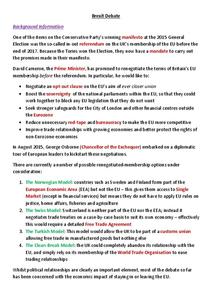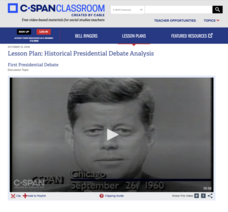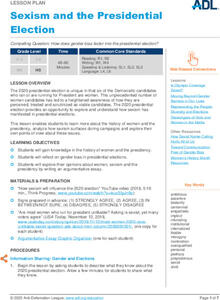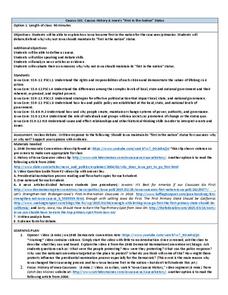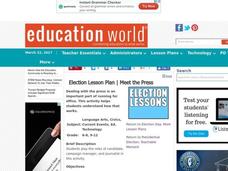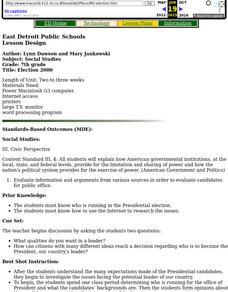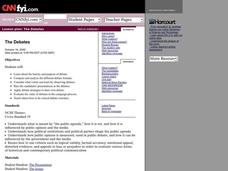Classroom Law Project
What should I watch for in the debates?
Prepare your classes for election year debates with a series of activities that model how to watch televised debates and how to evaluate the moderators as well as the debaters.
C-SPAN
Debates
How do the presidential debates of 2016 compare to the debates from the 1980's? What about the 1960's? Evaluate a chosen candidate or issue from the 20th and 21st centuries with a lesson plan focused on political debates. Middle and...
Brown University
The Candidates and Their Values: Election 2016
Voting for the next president of the United States is about finding the candidate who most closely aligns with your own values and sense of democracy. High schoolers become acquainted with the candidates from the 2016 election with a...
Amazon Web Services
Brexit Debate
Should we stay or should we go? Class members debate whether Britain should exit the European Union. While the resource predates the exit vote, the materials provide class members with an opportunity to explore some of the many...
Encyclopedia Britannica
Election Role-Playing Debate
After watching clips of presidential candidates during debates and speeches, and researching the candidate's position on important issues, young researchers conduct a role-play debate in which they act as one of the candidates.
Encyclopedia Britannica
Electoral College Philosophical Chairs Debate
Because of the Electoral College, it is possible to win the popular vote in a US Presidential election and still lose the election. After researching the pros and cons of the Electoral College, class members engage in a structured debate...
C-SPAN
Presidential Debate Analysis
The modern presidency is defined by the development of television—including the use of televised debates in the campaign. Using debates going back to the first one between John F. Kennedy and Richard Nixon, young scholars evaluate...
Curated OER
Presidential Election Year: Major Issues
Whether or not it's a presidential election year, this debate activity will spark research on current political issues. Split your government scholars into 4 groups and assign each a political party. One person will be the "candidate"...
Anti-Defamation League
Sexism and the Presidential Election
Young historians investigate how sexism impacted the 2020 United States presidential election. They examine media coverage of the six women candidates, engage in a four-corners debate reacting to statements about gender and the...
Curated OER
Presidential Elections: A Simulation
Feeling ambitious about getting your scholars examining the election process? While this presidential election simulation will take preparation, the ensuing enthusiasm will be worth it! Using one or more large classes, 12th graders are...
Curated OER
It's Up for Debate
In this lesson, students investigate the different platforms of each of the Presidential hopefuls for the 2000 election. Small groups each carefully research the platforms of an assigned candidate and then create a political pamphlet...
Curated OER
Who Could Have Been Who
Can word choice affect a candidate's likeability? Use a New York Times lesson to explore how a presidential candidate's likeability factor can fluctuate in public opinion polls. Young readers choose a presidential election from...
C-SPAN
Student Symposium and Resulting Action
Your class may not be able to vote yet, but that doesn't mean they can't feel like they're part of the presidential election! The resource creates a symposium where pupils debate about a selected topic in current events during an...
C-SPAN
Electoral College Pros/Cons and Alternatives
If every vote counts, why do we need the electoral college? Middle and high schoolers study the Constitutional precedent of the electoral college, as well as its place in historical and modern elections, with an engaging social studies...
Caucus 101
Caucus History and Iowa’s “First in the Nation” Status
What is a caucus? Why is Iowa's first? Why did Iowa shift to the caucus format? After researching these basic questions, class members debate the question of whether or not Iowa should maintain its "first in the nation" status for caucuses.
Curated OER
Debating Our Destiny
Learners participate in debates related to the history of the United States. In groups, they research their opinion on the purpose of debates and how a debater's posture affect the outcome of the debates. They identify the political...
Curated OER
Presidential Debate Primer
Students examine the function of presidential debates. In this civics lesson, students view segments of presidential and vice presidential debates. Students analyze the answers given in the debates and identify the platforms of the...
Curated OER
Growing Voters and Election 2004: Get Out the Vote
Students examine the voting process, the reasons citizens should vote, and participate in a community drive to sign up new voters. After looking at websites, students create a poster that outlines the reasons to vote, participate in a...
Scholastic
The Class Election from the Black Lagoon Storia Teaching Guide
One of my favorite things about this resource is that they use a standardized lexile to help you determine who should be reading what book. I also love this great teacher's guide for the book, The Class Election from the Black...
Curated OER
Meet the Press
Young scholars participate in a role play revolving around political elections. The roles of candidate, campaign manager, and journalist emphasized in this activity. Students listen to candidate interviews that are available online.
Curated OER
Youth voters and election turnout
Students investigate why 18- to 24- year-olds have a low turnout at the polls. Students develop a plan to encourage young Americans to vote, or write a persuasive essay telling why they should vote.
Curated OER
Election 2000
Seventh graders explore issues facing the potential leader of our country, form opinions about the candidates representing the two major political parties, research election material and choose candidates, conduct debates, and vote in...
Curated OER
The Debates
High schoolers examine the history and purposes of debate, and analyze the different debate formats. They rate the candidates' presentations in the debates, and apply debate strategies to their own debates.
Curated OER
The Great Debate
Young scholars watch tapes of televised presidential debates dating from 1960. They analyze debates and participate in mock debates.



